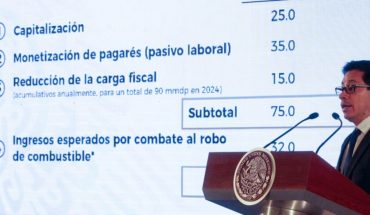By John Authers
If it can happen in Santiago, it could happen anywhere. That is the uncomfortable message that the rest of the world should receive from the sudden collapse of civil order in Chile, and unfortunately it is right.
The unrest and vandalism of recent days, which have provoked a state of emergency, a military response and even a statement by the president of Chile that the country is at war, reached the most stable and prosperous nation in Latin America, which had the the continent’s longest uninterrupted democracy before the coup d’état that installed the dictatorship of Augusto Pinochet in 1973, and has enjoyed an uninterrupted democracy since the peaceful fall of his regime in 1990.
Outside the country, Chile has been considered the living embodiment of economic policies installed under Pinochet by the “Chicago Boys”, a group of economists, many of whom attended the University of Chicago to learn about free-to-do ideas Market. Chile’s pension reform, in which everyone has to pay for state-supervised private pension plans, was used as a model by countries across the region, and has allowed for a steady accumulation of passive local capital.
Meanwhile, globalization allowed Chile to benefit from its huge copper reserves. In relative terms, its success is undeniable. In 1975, shortly after Pinochet took power, Chile’s gross domestic product per capita was lower than that of Mexico, Brazil, Argentina and even its neighbor Peru. Now, it has more wealth per capita than any of them and has avoided the crises that ravaged the rest of the region.
So the fact that Chileans have rebelled against the cost of living is alarming and suggests that a similar situation could easily happen in the rest of the developing world. Many assumed that insurrections like this would follow in the footsteps of the Great Recession; instead, that moment seems to have lagged behind a decade of slow recovery, but it has also deepened inequality. It is only now upon us, and television images of protests in Lebanon and elsewhere that only amplify Chile’s message.
If Chile seems like an unlikely combustion focus, why the explosion there? There are, I think, four key reasons. Together, they offer a disturbing model for other possible hotspots.
The first is inequality. The Chicago Boys’ agenda generated reasonably strong and stable aggregate growth, but Chile remains one of the most unequal countries in the world. It ranks one of the first places in inequality among the members of the Organization for Economic Cooperation and Development and, according to the World Bank, remains more unequal than its neighbors Argentina and Peru. People are much more angry about the increased cost of living if it is accompanied by a sense of injustice.
Secondly, the passenger was a proposal to increase public transport fares and electricity bills. There is ample evidence around the world that this can incite a rebellion more than anything else, something they should consider those who hope to reduce greenhouse gas emissions through a carbon tax. The violent protests by the Yellow Vests in France were due to hikes in gasoline taxes, which were deemed to punish people in the provinces that depended on cars and favored metropolitan elites. In 2017, Mexico recorded riots and protests against what is known as “petrolzo”, a 20% increase in fuel prices that was part of the government’s partial privatization of the state oil monopoly Pemex.
Last year, Brazil was rocked by protests and a truckers’ strike in response to fuel shortages and a sharp increase in the price of diesel.
Third, Chile lacks a populist movement, or a shrewd political leader. Such a figure might have been able to use public anger for its own purposes, but it would also have had a better chance of controlling it. For example, Mexico’s left-wing populist president, Andrés Manuel López Obrador, frequently led public protests, but successfully persuaded his followers not to resort to violence. In Chile, where conventional politics lacks a party or personality to channel its grievances, protesters have resorted to self-destructive vandalism. That is, while Charismatic Latin American populists tend to make Western leaders nervous – rightly – shows that they can play a vital role.
Finally, Chile’s dependence on commodities, particularly copper, caused it to suffer severe collateral damage from China’s economic slowdown and the U.S.-China trade war.
Chile relies heavily on its copper exports, the price of which in turn depends on the health of the Chinese economy. Because Chinese growth is slowing at a rate of 6%, the slowest in three decades, copper prices are again under pressure. That has led directly to a pressure for the Chilean peso:
A weakened currency makes it difficult for the Chilean government to balance its books.
Chile’s leaders must answer questions about why they have failed to diversify their economy so as not to rely solely on metals. But the country is far from alone. Several other emerging countries are equally exposed to metal prices, including Brazil.
US President Donald Trump said he hopes to sign a trade deal with China at a summit next month in Santiago. If Trump or his Chinese counterpart, Xi Jinping, has any doubt seventy questions about the damage their conflict could do in the rest of the world, they could seize the opportunity to look around while they are there.
translated from Spanish: Discontent in Chile has a worrying message
October 23, 2019 |





